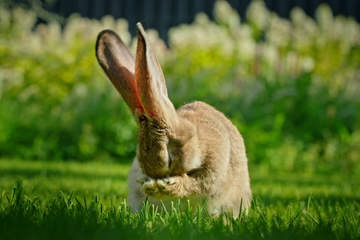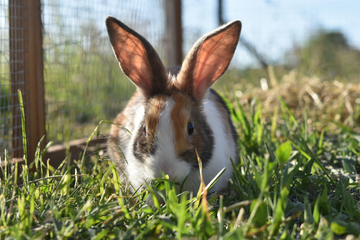Can Rabbits and Chickens Live Together Safely?
Keeping rabbits and chickens together sounds like a great idea, especially if you're raising animals in a backyard space. Both enjoy fresh air, foraging, and space to run. But while it may seem like a natural pairing, mixing these animals takes some planning. Rabbits and chickens have different needs, and setting up a safe, happy space for both is essential.
Click Here to Shop Rabbit Products.

This guide will walk you through what to consider if you're wondering, "Can rabbits and chickens live together?" We'll cover housing, health, feeding, and more to help you set up a peaceful environment for both animals.
Do Chickens and Rabbits Get Along?
Yes, chickens and rabbits can get along—at least sometimes. With a gentle introduction, they can often adjust to each other's company. Both are social animals, but they don't "speak the same language," so misunderstandings can happen.
One of the biggest differences is that chickens have a "pecking order." They use pecks and other behaviors to set up a social ranking. If not introduced properly, chickens may see a rabbit as an intruder and try to establish control. Rabbits are generally calm and avoid conflict but can feel stressed if chickens pick on them. To help them settle in together, give each animal plenty of space to retreat and relax.
Setting Up Housing for Rabbits and Chickens
If you're planning to house rabbits and chickens together, the right layout is essential. Here are some tips for creating a comfortable, low-stress space:
-
Space Requirements: Rabbits and chickens need lots of room to move, play, and rest. Crowded areas cause stress and increase the chance of fights. A large outdoor run with separate roosts and hideaways is ideal. Each animal should have spots where they can go to be alone.
-
Separate Sleeping Areas: Chickens need a coop with roosting bars, while rabbits need soft bedding in a quiet area. Create separate sleeping spots so each animal has a safe, cozy place to relax at night.
-
Protection from Weather: Chickens handle cold better than rabbits, which need insulated spots to stay warm and dry. Make sure the enclosure has sheltered areas to guard against wind and rain, with extra bedding to keep rabbits comfortable in winter.
Health Concerns When Housing Rabbits and Chickens Together
One of the biggest concerns about keeping rabbits and chickens together is disease. Chickens can carry bacteria, like Salmonella and Campylobacter, which usually don't harm them but can affect rabbits. Keep food, water, and bedding separate to limit cross-contamination. The Merck Veterinary Manual explains that rabbits are sensitive to respiratory illnesses, so their space should be well-ventilated and cleaned often to prevent ammonia from chicken waste.
Parasites are another concern. Both chickens and rabbits can get fleas, mites, and ticks, but their treatments vary. A good parasite control plan from a rabbit-savvy vet will help prevent infestations and keep both animals healthy.
Feeding Differences and Dietary Needs
Feeding is another area that needs close attention. Rabbits and chickens have very different diets, so feeding time must be managed well. Rabbits need a diet high in fiber—mainly hay, like Timothy hay, to aid digestion and keep their teeth healthy. Chickens, however, eat grains and protein-rich feeds. Rabbits rely on hay for healthy teeth and digestion. Mixing their foods can be risky, so set up separate feeding areas to prevent diet mix-ups.
Behavioral Compatibility Between Rabbits and Chickens
Understanding the behavior of each animal is key. Chickens are flock animals with a strong "pecking order." They may peck at a rabbit as part of this social structure. This can be stressful for rabbits, who are generally more quiet and cautious.
Rabbits may nip if scared. Watch for signs of stress, such as raised feathers or twitching ears, and separate the animals if needed. Having "safe spaces" for each animal helps them avoid confrontations and stay calm.

Steps to Introduce Rabbits and Chickens
Introducing rabbits and chickens needs to be done slowly. Here's a step-by-step approach for safe introductions:
-
Start with a Barrier: Begin with rabbits and chickens separated by a fence or wire so they can see and smell each other without direct contact. This lets them get used to each other safely.
-
Supervised Interaction: After about a week, let them interact in a neutral area, keeping sessions short and positive. Gradually increase the time they spend together as they get more comfortable.
-
Watch Their Body Language: Look for signs of tension, like flat ears in rabbits or aggressive pecking from chickens. If either animal seems stressed, separate them and try again another day.
-
Increase Time Gradually: Over a few weeks, let them spend more time together, always supervising and ensuring they have escape routes.
Remember, some animals will adjust quickly, while others may need more time. Keep an eye on each animal and be patient during this process.
Maintaining a Safe Environment
Once rabbits and chickens are sharing a space, regular cleaning is a must. Chickens produce more waste than rabbits, which can lead to ammonia buildup if left unchecked. A thorough clean-up every week will help keep their space safe. The RSPCA recommends weekly deep cleans of bedding, feed, and water areas to prevent health issues.

For bedding, use straw or wood shavings for chickens and softer materials like hay for rabbits. High-quality hay provides rabbits with essential fiber and doubles as comfortable bedding.
Key Takeaways for a Peaceful Shared Space
If you're still asking, "Can rabbits and chickens live together?" the answer is yes, with some effort and care. Both animals need space, separate feeding spots, and ongoing health checks. Here are some final tips for a peaceful shared habitat:
-
Separate Feeding Areas: Use designated areas for feeding to avoid diet mix-ups.
-
Regular Health Monitoring: Watch for signs of illness and consult a vet if you're unsure about any health changes.
-
Ample Space and Hiding Spots: Make sure each animal has space and access to hideaways, reducing stress and promoting calm.
-
Observe Behavior Changes: If you see aggression or stress, separate the animals temporarily. Giving them more time or space may help ease tension.

So, Can Rabbits and Chickens Live Together Safely?
With a little patience and careful planning, rabbits and chickens can live together peacefully. Successful cohabitation depends on respecting each animal's needs and taking time to ease them into sharing a space. Although not every pairing will work, many rabbits and chickens can thrive together in a well-managed environment.

"Why Is My Rabbit Licking Her Own Pee?"

Rabbit Is It Low Maintenance or More Work Than You Think?

Tips to Manage Rabbit Chewing Habits









